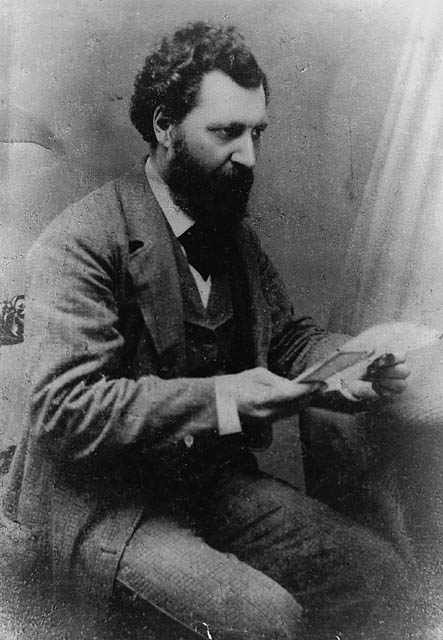3rd Monday in February
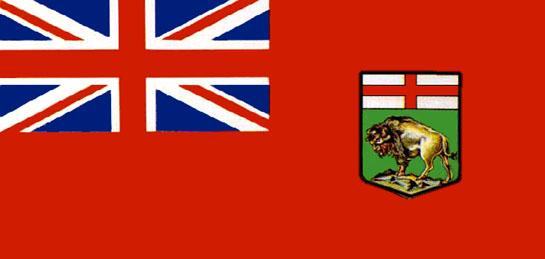
Lunatic or a Patriot? The Voice of God or an Enemy of the People?
Nope, not George Bush, we’re talking about another controversial figure, whose life is celebrated today in Manitoba.
Louis Riel was a leader of the Metis people of Manitoba and Saskatchewan and of French-Canadian Catholics.
Riel studied to become a priest and then a lawyer, but did not complete either training. Still, his education and his powerful speaking abilities allowed him to become the mouthpiece of the Metis people.
The Metis were the descendants of the native peoples of Manitoba and early French-Canadian settlers.
In the 1860s the Canadian government was preparing to absorb a large territory ‘owned’ by the Hudson Bay Company. Riel’s homeland, the Red River Colony, was within the territory’s bounds, and the Metis people feared they would lose autonomy over the their own land.
“As tensions mounted among the Metis it was clear that strong leadership was needed. Riel’s experiences during the past ten years had produced a life-style very different from that of the buffalo-hunting Metis, but it was these people he now aspired to lead…Riel — ambitious, well-educated, bilingual, young and energetic, eloquent, deeply religious, and the bearer of a famous name — was more than willing to provide what the times required.”
The term “Red River Rebellion” is used to describe the events of 1869-1870, when Riel led a provisional government that opposed the surveying of their land by the Canadian government and occupied the Canadian Upper Fort Garry.
The rebellion was mostly bloodless, but during this time Riel ordered the controversial execution of Thomas Scott, a Protestant Orangeman from Ontario, originally from Northern Ireland. Scott had taken part in an action against Riel’s men and had been taken prisoner in an attempt to rescue a local Canadian leader named JC Schultz.
After the Rebellion Sir John A. MacDonald, concerned about the possibility of the land being annexed by Minnesota, placated the Metis with the creation of the provence of Manitoba. But the Protestant outcry over the Thomas Scott killing was strong. MacDonald refused to grant clemency to Louis Riel for his role in the execution.
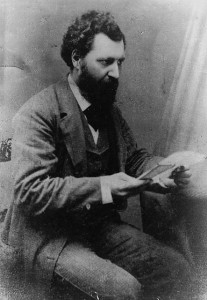
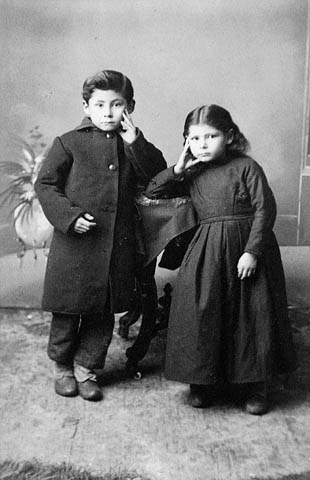
(left) Louis Riel, circa 1875; (right) His children Jean-Louis and Angelique, 1880
Riel spent the next 14 years in exile, in Quebec, New England and the American Midwest. He was elected twice to parliament by Quebec, but could not take his seat in Ottawa on account of the warrant for his arrest.
In 1884 Riel was teaching school in Montana when he was approached by some Metis representatives from Saskatchewan who asked for his help in negotiating for their land rights with Canada.
What they may not have known was that during the intervening years Riel had spent time in mental institutions and became increasingly convinced that he had been chosen by God to lead his people.
The second Rebellion was not as bloodless as the first. In the end Riel was placed on trial for treason. Riel refused his lawyers pleas to declare himself not guilty by reason of insanity. He was found guilty, and though the jury recommended mercy on his behalf, the judge ordered his execution. It has been said that Riel was found guilty of treason, but was executed for the murder of Thomas Scott.
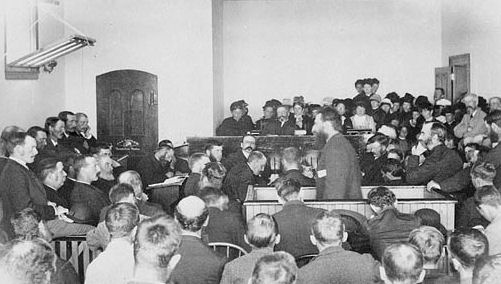
Riel testifies at his trial, 1885
In those years and the decades following his death Riel was painted as an insane megalomaniac traitor by the mostly Protestant Canadian media. However he remained a hero and symbol of nationalism to the Metis people and many French-Canadians
Also today, the third Monday in February, Alberta residents celebrate “We’re not Saskatchewan Day.”
OK, not really, but..
http://www.saskabush.com

